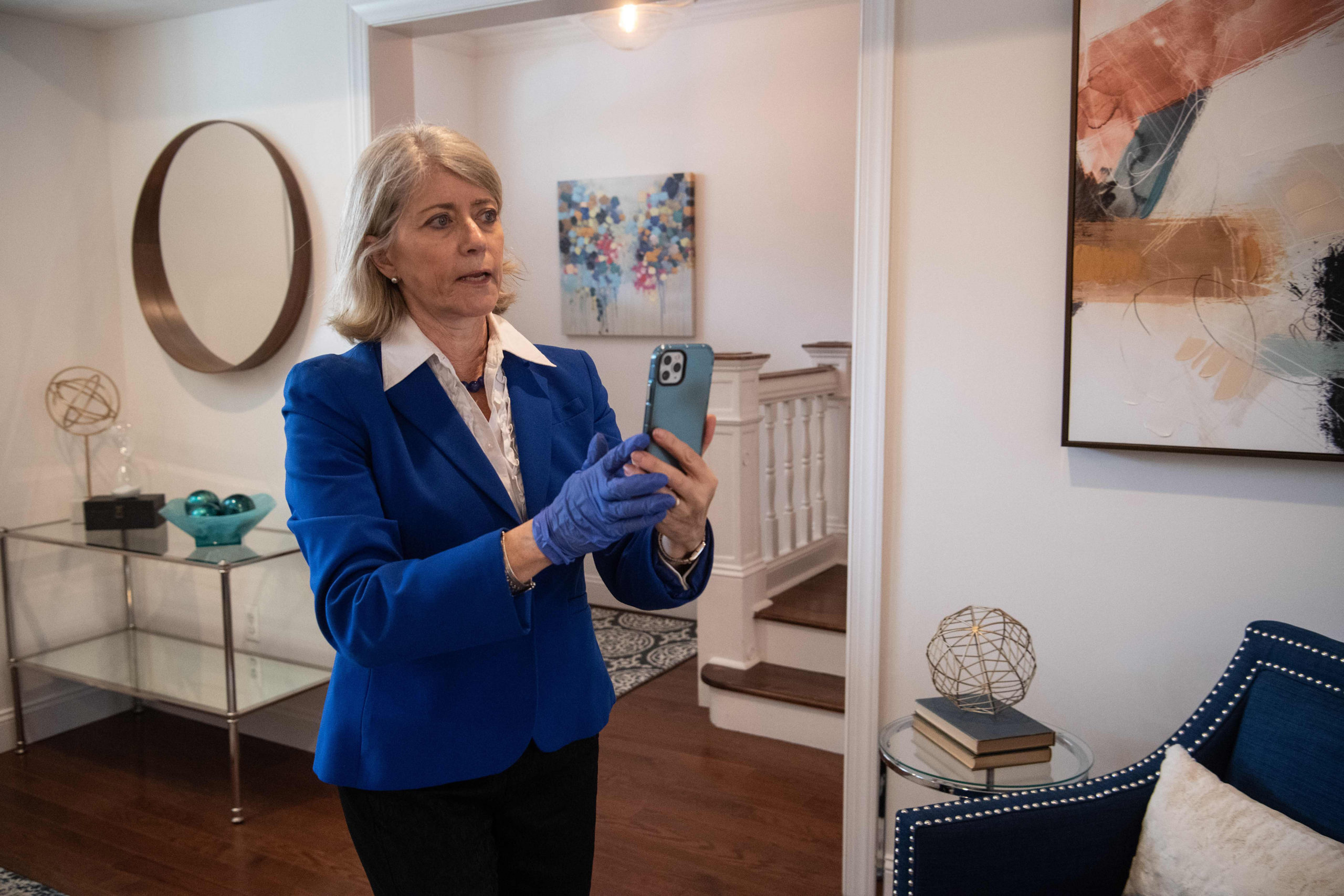Virus forces real estate agents to go virtual
Real estate agent Dana Scanlon conducts a virtual tour of a house with a client over Facetime in Washington, DC (NICHOLAS KAMM)
Washington (AFP) – Sporting rubber gloves, realtor Dana Scanlon opens the shutters in a Washington house and turns on the lights, making sure that everything is in order before her client visits — virtually, due to the coronavirus.
“It’s all very odd. It’s all very different,” she said. “We’re completely reinventing how we do things in the short run.”
A 14-year veteran of the real estate market, Scanlon is nostalgic for the pre-pandemic era.
“It’s a very personal thing when people are buying a home,” she said, pointing out that falling in love with a house most often occurs once a client physically enters the building.
“You’re guiding them to find a place where they can visualize themselves living and enjoying and raising their family or their dog or whatever it is,” she added.
But the new reality has completely upended traditional practices and mandated social distancing.
Fifty-eight percent of buyers have taken part in virtual house tours, according to a survey conducted on April 19 and 20 by the National Association of Realtors (NAR).
– Don’t panic –
The US housing market has not yet completely crumbled, despite house sales dropping 15 percent in March and numbers likely to continue that trend in April.
According to NAR, 74 percent of real estate agents reported that their clients did not lower house prices in an attempt to draw more potential buyers, indicating that the sector is not yet suffering from panic sales.
“It appears the current decline in buyer and seller activity is only temporary,” said Lawrence Yun, NAR’s chief economist.
But for the time being, it’s the end of the American tradition of “open houses,” when potential buyers could on a Saturday or Sunday stroll through houses newly placed on the market.
“A few weeks ago, I had a house in Bethesda,” said Scanlon, referring to the upscale Washington suburb. “I did an interactive virtual tour of the house…. I had 12 people on my Zoom account.”
The house has since been sold — but without the traditional celebration at the end of the process.
“We’ve been on a journey together with our clients, and not to be able to do that last big hug at the end is sad,” said Scanlon, adding that realtors have had to get creative in the face of the pandemic.
In the house in Washington’s Petworth neighborhood, which she is showing to her client Frank Wu, Scanlon takes care to show all aspects — “the good, the bad and the ugly.”
A virtual visits “puts an extra responsiblity on us,” she said as she opened a window in the living room, noting a nearby construction zone marring the otherwise lovely view from the porch.
– 360-degree view –
The virtual tour doesn’t bother Wu. “We have a 360-degree view instead of photos. Much better,” he said.
Wu isn’t shy about asking Scanlon to show him things, even retrace her steps to see if there’s room for a big television or what condition the fridge is in.
When Scanlon jokingly asks if he plans on watching football games, Wu quips back that there are no sports anymore.
In the bathroom, Wu asks her to turn on the faucet to check the water pressure.
“It gives me a good sense of the house,” the potential buyer told AFP, adding that the pandemic won’t hobble his real estate projects.
– ‘Zoom fatigue’ –
“If I see a good deal, if I see a house I really like, I’m definitely gonna put in a deal,” Wu said, adding he wants to stop renting. “I have the money ready.”
“The listings are the key” for the industry’s future, NAR economist Yun told AFP. Professionals expect more listings of homes for sale to appear on the market as the economy recovers.
“With buyers facing historically low mortgage rates and over 70 percent of Americans in secure employment, home sales will naturally rise with more listings,” he said.
Scanlon is also confident. What makes things different from the Great Recession in 2008 is that “this is not a real estate-driven collapse of the markets,” she said.
She paused to rest her arm, which had grown sore after holding up her phone for the past 20 minutes to conduct the tour. Just one side effect of “Zoom fatigue” — the growing weariness of doing everything virtually.
Disclaimer: Validity of the above story is for 7 Days from original date of publishing. Source: AFP.


